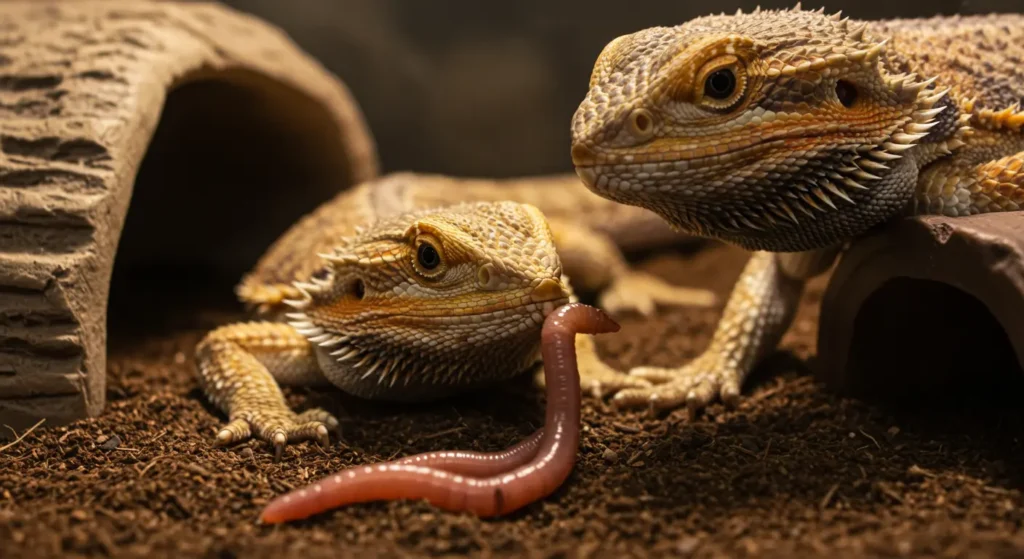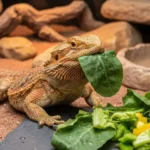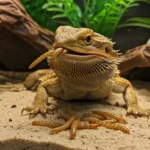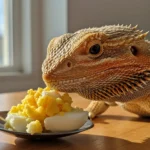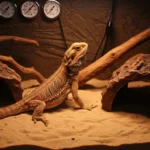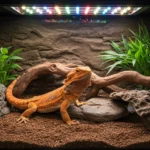Can a bearded dragon eat earthworms? Many owners ask this when looking to add variety to their pet’s diet. Earthworms are easy to find, high in moisture, and packed with protein. But are they actually safe?
You might wonder, “Can a bearded dragon eat earthworms without any risks?” The truth is, these worms offer some benefits—but they also come with hidden dangers that could impact your reptile’s health.
This guide covers everything you need to know. You’ll learn when earthworms are a good idea, when to avoid them, and how to feed them the right way. If you care about safe and nutritious feeding, keep reading. The answer might surprise you.
Can a Bearded Dragon Eat Earthworms Safely in Their Diet?
Yes, a bearded dragon can eat earthworms—but only if you follow the right precautions. While they offer some nutritional benefits, they can also carry hidden dangers like parasites or toxins. Knowing how to choose and prepare earthworms makes all the difference.
Nutritional Benefits of Earthworms for Beardies
Earthworms may not look like much, but they pack a powerful nutritional punch. They are naturally high in protein, which supports muscle growth and repair—especially in young or active dragons. Unlike fattier feeder insects, earthworms contain minimal fat, making them a lean choice that won’t lead to unnecessary weight gain. Their high moisture content also offers an added bonus: extra hydration, which is helpful for bearded dragons that don’t always drink from a bowl. While they shouldn’t replace your beardie’s staple feeders, earthworms can be a healthy addition when offered in moderation.
Are Earthworms a Digestible and Hydrating Insect Option?
Yes, and that’s one reason many reptile owners consider them. Earthworms are soft-bodied, which means your dragon can chew and digest them with ease. Their texture is gentle on the digestive system, making them a safer choice for dragons with sensitive stomachs. Thanks to their moisture-rich bodies, earthworms also contribute to your pet’s overall hydration—something dry feeders like crickets can’t do as effectively.
How Soft-Bodied Worms Support Bearded Dragon Digestion
When compared to harder insects like mealworms or superworms, earthworms are much easier on the gut. Their lack of tough exoskeletons means they pass through the digestive tract with less strain. This reduces the risk of impaction—a serious condition that occurs when indigestible matter builds up in the intestines. For young beardies or those with prior digestive issues, earthworms can offer a gentler feeding experience.
The Pros and Cons of Earthworms in a Bearded Dragon’s Feeding Plan
Earthworms can offer both benefits and risks when added to your bearded dragon’s menu. While they may seem like a healthy, protein-rich treat, there are some concerns you shouldn’t ignore. Understanding the pros and cons will help you make a smart, balanced choice for your pet’s nutrition.
High-Protein, Low-Fat: Earthworm Health Perks Explained
Earthworms are a surprisingly nutrient-dense feeder option. They’re rich in essential amino acids that help support your bearded dragon’s muscle growth, especially during development or recovery. Their low fat content makes them a lean alternative to fatty insects like waxworms, which can lead to obesity if overfed. Additionally, their soft, moist bodies contribute to hydration—an often overlooked benefit for reptiles that rarely drink from standing water.
Parasites, Pathogens, and Heavy Metals in Wild Worms
Although earthworms can be healthy, wild ones come with serious risks. Worms collected from gardens or fields may carry parasites like coccidia, harmful bacteria such as salmonella, or toxic substances like lead and cadmium. These contaminants enter the worm’s body through soil and decaying matter. Feeding your dragon these wild-caught worms without proper sourcing or cleaning could lead to illness—or worse.
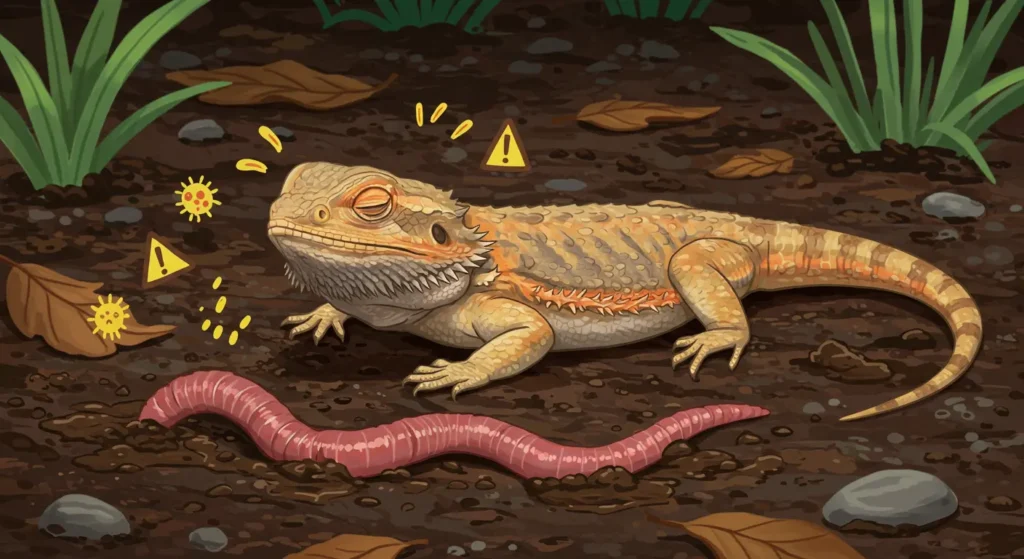
Comparing Earthworms to Mealworms, Waxworms & Dubia Roaches
Earthworms are softer and easier to digest than mealworms, which have tough exoskeletons. Compared to waxworms, they offer less fat and are a better choice for routine feeding. However, Dubia roaches remain the gold standard for nutrition and safety. Earthworms can be a helpful supplement, but they shouldn’t replace more balanced feeder insects.
Safe Ways to Prepare Earthworms for Your Reptile Pet
Feeding earthworms to your bearded dragon can be beneficial, but only if they’re handled the right way. A few simple steps can turn a risky feeder into a safe, nutritious snack. Proper preparation is key to protecting your pet from harmful bacteria, parasites, and toxins.
Best Sources to Buy Feeder Earthworms (Online or Local)
Not all earthworms are safe for your bearded dragon. Avoid collecting worms from your backyard or garden, as they may carry pesticides, parasites, or heavy metals from the soil. Instead, look for earthworms sold specifically for reptile feeding. Reputable pet supply stores, exotic reptile shops, and even some bait stores offer safe, farm-raised options. When buying online, choose sellers that specialize in feeder insects and list their breeding conditions clearly. Quality sourcing helps eliminate many of the common risks associated with wild-caught worms.
Cleaning, Quarantining, and Gut-Loading Earthworms
Before feeding, rinse the worms thoroughly in clean water to remove surface bacteria and debris. For added safety, consider quarantining them for a few days in clean, moist soil. During this time, gut-load them by feeding fresh, pesticide-free vegetables. This boosts their internal nutrient content and reduces the chance of contamination. Clean, well-fed worms are much safer for your beardie to digest.
Boosting Nutrition with Calcium Dusting and Supplements
Earthworms naturally contain low calcium levels. To improve their nutritional balance, lightly dust them with calcium powder before feeding. This is especially important for young dragons and breeding females, as it helps prevent metabolic bone disease (MBD). You can also rotate in multivitamin powders once or twice a week for added nutritional variety.
How Often to Feed Earthworms to Juvenile or Adult Bearded Dragons
Feeding earthworms to your bearded dragon isn’t just about what—they also need the right amount at the right time. Age, size, and digestive health all play a role in how often these worms should be offered. Let’s explore how to safely add them into your beardie’s routine without overdoing it.
Ideal Portion Sizes for Safe Earthworm Feeding
When feeding earthworms, size matters just as much as quantity. A good rule is to choose worms that are no wider than the space between your bearded dragon’s eyes. This helps prevent choking or intestinal blockage. Start with just one or two worms to see how your dragon reacts. If digestion goes smoothly and your pet shows no signs of discomfort, you can slowly increase the portion—but only in moderation.
Signs of Overfeeding or Gastrointestinal Issues in Beardies
Feeding too many earthworms at once can lead to digestive trouble. Bearded dragons that are overfed may show signs like bloating, lethargy, or constipation. In more severe cases, you might notice a loss of appetite or reduced activity. Always monitor your dragon after introducing a new food. If symptoms appear, pause earthworm feeding and consult a reptile vet.
Feeding Frequency by Age and Size of Your Bearded Dragon
Juvenile bearded dragons have faster metabolisms and may enjoy small portions of earthworms once a week. Adults, however, should eat them less often—perhaps once every two to three weeks. Use earthworms as an occasional supplement, not a regular staple, to avoid nutrient imbalances.
Still Unsure? Try These Beardie-Safe Worm Alternatives
If you’re hesitant about feeding earthworms, you’re not alone. Fortunately, there are plenty of other safe, nutritious insects that your bearded dragon can enjoy. Let’s explore some trusted alternatives that offer both variety and peace of mind.
Safer Options: Dubia Roaches, BSFL, and Superworms
If you’re looking for reliable alternatives to earthworms, consider Dubia roaches, black soldier fly larvae (BSFL), and superworms. Dubia roaches are one of the most balanced feeder insects available—they’re high in protein and calcium, easy to digest, and low in fat. BSFL are also rich in calcium, making them ideal for preventing metabolic bone disease. Superworms offer more fat, so they should be fed occasionally, but their movement and size make them a favorite treat. These feeders are widely available and less likely to carry harmful pathogens.
What Reptile Vets Say About Earthworm Safety
Many reptile veterinarians caution against using wild-caught earthworms. The reason is simple: they may carry bacteria, parasites, or toxins from the soil. Instead, vets typically recommend feeders that are commercially bred under controlled conditions. These options are cleaner, safer, and more consistent in nutrition.
Can Baby Bearded Dragons Eat Earthworms Too?
Baby dragons can eat earthworms, but only under strict conditions. The worms must be small, soft, and thoroughly cleaned. They should be offered occasionally as a treat—not as a daily food source.
Final Thoughts – Should You Add Earthworms to Your Beardie’s Diet?
Feeding earthworms to your bearded dragon isn’t a one-size-fits-all decision. It depends on your comfort level, your dragon’s health, and how well they tolerate new foods. Let’s wrap up with a clear summary to help you decide what’s best for your beardie.
Key Takeaways About Earthworms as Reptile Food
Earthworms can be a useful addition to your bearded dragon’s diet, but they’re not risk-free. They offer moisture, protein, and trace minerals, which can support hydration and growth. However, their safety depends heavily on where they come from and how they’re prepared. Always source earthworms from trusted suppliers and avoid wild-caught ones that could carry harmful substances. Clean handling is just as important as nutritional value.
Responsible Feeding: Tips for Safe Insect Variety
A well-rounded insect diet keeps your bearded dragon healthy and engaged. Rotate between different feeder insects like Dubia roaches, BSFL, and superworms. Avoid relying too heavily on one type of insect, and make sure all feeders are gut-loaded and clean. Always observe your dragon after introducing new food, and adjust based on how they react.
Share Your Earthworm Feeding Experience with Other Owners
Have you tried offering earthworms to your beardie? Share your tips, results, or any challenges in the comments. Your experience might help another owner make a more informed decision.
Conclusion: Can a Bearded Dragon Eat Earthworms?
So, can a bearded dragon eat earthworms? Yes—but with caution and care. These soft-bodied worms can provide protein, hydration, and variety to your pet’s diet. However, they’re not without risks. Parasites, toxins, and digestive issues can all become concerns if you don’t source and prepare them properly.
If you choose to include earthworms, treat them as an occasional supplement—not a staple food. Focus on cleanliness, trusted suppliers, and portion control to keep your bearded dragon safe and healthy. And remember, every beardie is different. Monitor how yours responds and adjust as needed.
In the end, feeding earthworms is a personal decision—one that depends on your dragon’s needs and your level of comfort. Done right, it can be a rewarding and nutritious addition to their menu.

